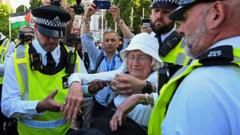Should Laws Be Reevaluated After Palestine Action Arrests?

The Call for a Review of Terrorism Laws Amid Controversial Arrests
The recent surge in arrests related to the activities of Palestine Action has ignited a heated debate surrounding the application of terrorism laws in the United Kingdom. With over 500 demonstrators detained during a protest supporting the banned group, the Liberal Democrats have raised concerns about the implications of using such laws against peaceful protesters. This situation underscores the delicate balance between maintaining national security and protecting fundamental rights, particularly the right to free speech and assembly.
The Background of Palestine Action and Its Ban
Palestine Action, a group with a history of direct action against Israeli interests, was banned by the UK government in July following a series of protests and actions that the authorities deemed violent. The group's activities included vandalizing military equipment and facilities, which they justified as a form of protest against perceived injustices in Palestine. The government cited "clear security assessments" to justify this ban, describing the organization as "not a non-violent organisation."
The ban transformed any support for Palestine Action into a criminal offense, potentially leading to significant penalties, including imprisonment for up to 14 years. This legal framework raises critical questions about the impact on individuals merely expressing their support for the group's cause or protesting against the government's actions.
Recent Arrests: A Chilling Effect on Free Speech?
The mass arrests during the demonstration have been labeled as the largest single-day operation by the Metropolitan Police in the last decade. Critics argue that such heavy-handed policing poses a threat to democratic freedoms, particularly the right to protest. The Equality and Human Rights Commission voiced its concerns about the policing methods employed during events related to Gaza, the West Bank, and Israel, emphasizing the need for a balanced approach that respects free expression.
Baroness Kishwer Falkner, chair of the commission, expressed apprehension that the current policing tactics might deter individuals from exercising their rights. The fear of potential consequences for peaceful protests could foster a chilling atmosphere, where citizens hesitate to voice their opinions or engage in demonstrations out of fear of legal repercussions.
The Liberal Democrats' Stance
Lisa Smart, the Liberal Democrats' home affairs spokesperson, emphasized the party's recognition of the seriousness of Palestine Action's activities while also advocating for the protection of peaceful protesters. Smart has called for a review of the terrorism laws being employed against demonstrators, arguing that existing legislation, like the Public Order Act, could adequately address any unlawful actions without infringing on the rights of peaceful protesters.
The call for a review highlights a critical tension within the legal framework: the need to ensure public safety and national security while simultaneously safeguarding the fundamental right to free speech. Smart's appeal to Jonathan Hall KC, the independent reviewer of terrorism legislation, underscores the urgency of reassessing the use of such powers in a manner that prevents future misuse.
Government's Justification for the Ban
In response to the growing controversy, Home Secretary Yvette Cooper has defended the government's decision to prohibit Palestine Action, asserting that the group has engaged in violent actions and significant criminal damage to national security infrastructure. Cooper's statements have been met with skepticism by critics, who argue that the actions of a few should not justify sweeping measures against broader peaceful protests.
Cooper also mentioned that some individuals opposing the ban may not fully grasp the nature of Palestine Action due to ongoing legal restrictions that limit public discourse about the group's activities. This statement raises further questions about transparency and the public's right to be informed about the implications of such bans on civil liberties.
The Broader Implications of Terrorism Laws
The situation surrounding Palestine Action serves as a crucial case study in the ongoing debate over the intersection of national security and civil liberties. The use of terrorism laws can have profound implications for how societies navigate issues of dissent and protest. When laws that are intended to protect public safety are perceived as tools for suppressing legitimate expression, the fabric of democracy can be at risk.
As governments grapple with the challenges posed by extremist groups, the need for clarity and precision in legislation becomes paramount. Misuse of terrorism laws could create a slippery slope, where peaceful dissenters are unjustly categorized alongside individuals engaging in actual violence. It is essential for legal frameworks to be robust enough to address threats without encroaching on the rights of citizens to express their views or participate in peaceful assembly.
FAQs
What is Palestine Action?
Palestine Action is a direct action group that protests against Israeli interests and advocates for Palestinian rights. The group has been involved in various controversial protests and actions, leading to its ban by the UK government.
Why was Palestine Action banned?
The UK government banned Palestine Action due to its involvement in violent activities and criminal actions against national security infrastructure, which officials deemed a threat to public safety.
What are the potential consequences of supporting a banned group like Palestine Action?
Supporting a banned group like Palestine Action can lead to criminal charges, with penalties that may include imprisonment for up to 14 years, as per the provisions of the Terrorism Act.
How are terrorism laws impacting free speech in the UK?
The application of terrorism laws can create a chilling effect, deterring individuals from exercising their right to free speech and assembly due to fear of arrest or legal repercussions, especially in the context of protesting against government actions.
What do civil rights advocates say about the use of terrorism laws against protesters?
Civil rights advocates argue that using terrorism laws against peaceful protesters undermines democratic freedoms and that existing laws, like the Public Order Act, could sufficiently address unlawful actions without infringing on civil liberties.
What is the role of the independent reviewer of terrorism legislation?
The independent reviewer of terrorism legislation is tasked with assessing the application of terrorism laws and ensuring that they are not misused. This reviewer plays a crucial role in maintaining a balance between security and civil rights.
The current situation surrounding Palestine Action highlights the complexities of balancing national security with the protection of civil liberties. As we navigate these challenging waters, it prompts an important question: How can societies ensure that the fight against extremism does not come at the cost of fundamental freedoms? #FreeSpeech #CivilRights #TerrorismLaws
```Published: 2025-08-15 12:56:06 | Category: sport



